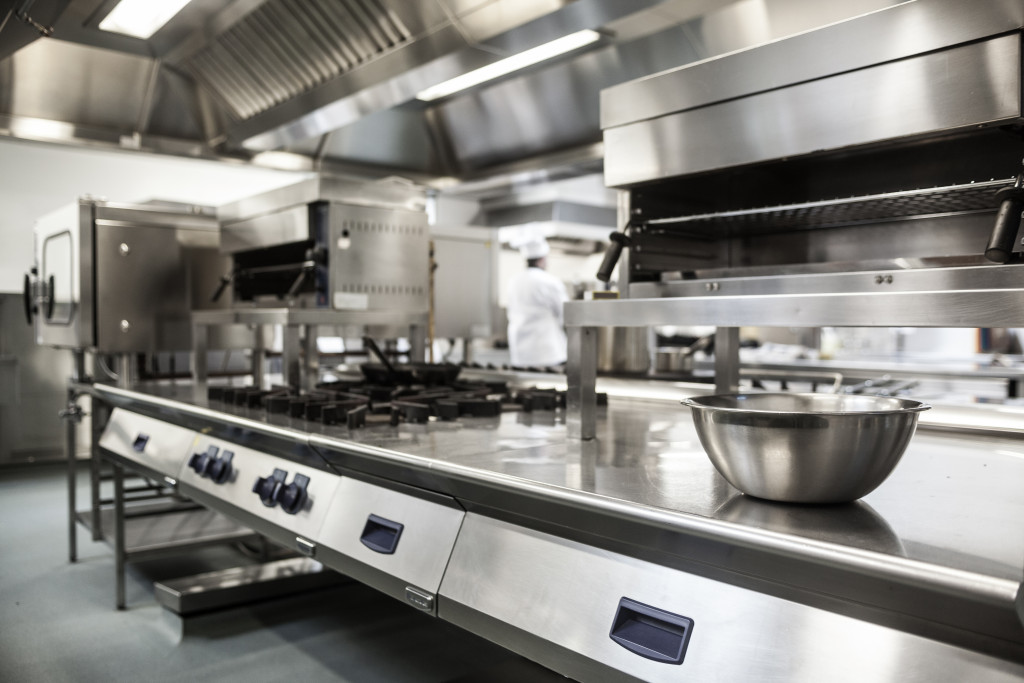The cleanliness of your commercial kitchen should always be a top priority, regardless if it’s in a cafeteria or a hotel restaurant. A healthy kitchen environment ensures the safety of your employees and customers by preventing contamination, so make sure to implement strict sanitation guidelines to avoid any potential lawsuits following the Hazard Analysis Critical Control Point (HACCP) procedures.
Below are some tips on maintaining the cleanliness of your kitchen and avoid contamination:
Keep Kitchen Floors Clean
Although floors are not in direct contact with food, improper cleaning can lead to grease, food buildup, and bacteria that can attract pests and cause illnesses. Dirty and slippery floors can also cause your employees to slip and fall. Avoid contamination and potential accidents by making sure the floors are always clean and sanitized.
Invest in high-quality epoxy flooring to reduce the spread of bacteria and make kitchen floors last a long time. Since food processing establishments are constantly exposed to spills, foot traffic, and germs, a decent flooring solution can help prevent potential accidents that lead to employee and customer lawsuits.
One common mistake in cleaning the kitchen floor is using dirty mops. When you or your staff use the same bucket of water throughout the kitchen, you’ll spread more germs instead of cleaning the floor. Make sure the mop water is constantly changed as soon as it changes color. If it remains clear after a few mopping sessions, it means you’ve effectively removed all dirt.
Maintain Temperature Monitoring
Do not forget to instruct your team to keep food at proper temperatures to avoid bacterial growth that can cause food poisoning. As the owner and manager, you must set a temperature monitoring schedule and train employees to keep up with that schedule to avoid any contamination.
You should also review your refrigerators’ correct temperature setting to maintain optimal storage conditions and minimize bacterial growth. As long as you keep food at the right temperature and avoid mixing it with other types of food, it will help prevent cross-contamination.
Ensure Good Employee Hygiene

Employee cleanliness and hygiene are related to food safety and the overall customer experience. If everyone understands how important it is to maintain cleanliness, there will be fewer instances of food contamination and unsatisfied guests.
Your employees are the front-liners of your business, so it’s essential to make them value cleanliness as they represent your brand. Here are some tips to ensure your employees maintain proper hygiene:
- Train Them on Proper Hand Washing: Hand washing is one of the most effective ways to stop the spread of germs and bacteria. Make sure your employees are well-trained to know the importance of frequent hand washing.
- Have Them Wear Clean and Proper Uniforms: Neat uniforms not only make your employees represent your brand well, but they are also essential to avoid the spread of bacteria when preparing and serving food. Make sure everyone does not forget the essentials like gloves, aprons, and hairnets.
- Jewelry Should Not Be Allowed: Food can get stuck to jewelry with intricate details and transferred to another dish, causing cross-contamination. Employees should be well aware that these are not allowed when they are on shift.
Store Food the Right Way
Following HACCP guidelines, you must properly label all your food to make it easy to identify and avoid cross-contamination. For instance, your team should keep raw meat and dairy in separate containers or fridges to prevent bacteria from multiplying. You must also supply airtight food storage containers to avoid leakage, contaminating utensils or other food items.
Keep food off the floor and away from contaminants by using shelving units. Avoid overcrowding them for efficient organization and to avoid any spillage.
Clean and Disinfect Surfaces and Utensils
Contaminants from utensils and surfaces can spread to food, which is why there are designated utensils for every food type, and you must keep all preparation and cooking surfaces clean and dry. It’s not enough to clean your equipment; you should also hire professionals to sanitize your entire kitchen or production floor.
While cleaning can help remove visible dirt and food particles, sanitizing removes germs and bacteria. Both are necessary as cleaning is not enough, and you can’t sanitize a surface directly without cleaning it. This is a crucial step, as sanitizing helps reduce illness-causing germs that survive even after washing with soap and water.
Cleanliness should be a top priority, especially in a commercial food business. Maintaining food safety procedures keeps your team healthy and avoids lawsuits from customers who get sick or penalties from surprise health inspections. Ensure your facility is equipped with complete cleaning, sanitizing, and disinfecting materials to prevent contamination.
As long as you train your employees well, they will value the importance of keeping a sanitized kitchen that will attract and retain customers and maintain your brand’s reputation.

